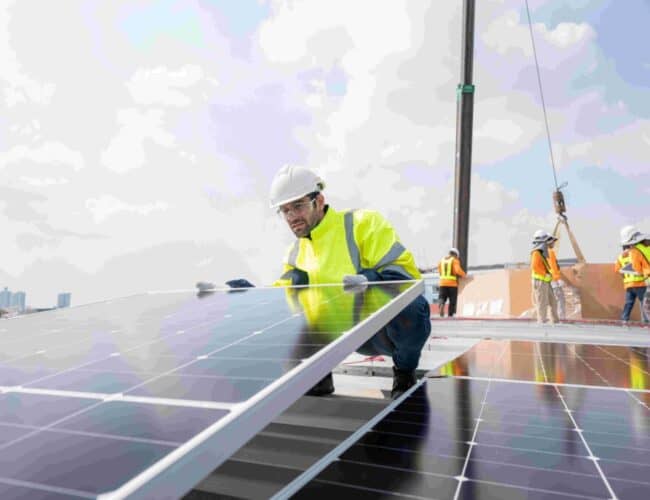
Switching to solar energy is a smart move for your business—it cuts costs, boosts sustainability, has a great return on investment (ROI) rate, and enhances your brand’s reputation.
But the key to a successful transition lies in choosing the right commercial solar provider. With so many options out there, how do you pick the best one for your needs? Read on to learn how.
Understand Your Business’s Solar Needs
Before you start comparing solar project providers, assess your energy requirements. Ask yourself:
- How much energy does your business consume monthly? Check utility bills to gauge your usage.
- What’s your budget for solar installation? Know your financial limits upfront.
- Do you want to buy, lease, or use a power purchase agreement (PPA)? Each option has pros and cons.
- What’s your roof’s condition and available space? Solar panels need ample, unobstructed space.
Having clear answers helps you narrow down providers who can meet your specific needs.
Look for Experience and Expertise
Not all solar companies are created equal. You want a provider with a strong track record in commercial building installations—not just residential.
Check the following information: the number of years they’re in business (having years of experience is more reliable than a new startup), commercial project portfolio (ask for case studies or examples of past solar power systems for businesses installations), and certification and licenses.
An experienced provider will handle permits, system design, and installation smoothly, saving you headaches.
Compare Equipment Quality and Warranties
Solar panels and inverters vary in efficiency, durability, and cost. Opt for high-quality equipment that maximizes ROI.
Check for the following when it comes to the equipment needed for solar installations for commercial buildings: panel efficiency (a higher efficiency means more clean energy production in less rooftop space), the reputation of the solar energy systems manufacturer, the type of inverter alongside the solar panel installations, and rooftop solar warranty.
A reputable provider will offer top-tier solar system equipment with strong warranties – this is to ensure long-term reliability and efficacy.

Evaluate Financing Options
Solar is a big investment, but you don’t have to pay everything upfront. A good provider should offer different financing options and possible solar incentives that you can take advantage of.
Look for solar loans, solar leases, and available financial incentives (examples include tax breaks for business owners that have commercial panels, rebates for solar panel systems, lower monthly payment schemes, and many more).
Remember to ask providers to break down costs and compare financing terms before deciding.
Check Customer Reviews and References
Word of mouth matters. Research what other businesses say about the provider.
You can go through online reviews and look for consistent top ratings, case studies and testimonials (reliable providers showcase successful projects), and ask for references that you can utilize to connect with past clients and ask for feedback yourself.
Assess Their Maintenance and Support
Your relationship with the provider doesn’t end after installation. Solar systems need occasional maintenance, so ask about the following:
- Do they offer monitoring services? Real-time tracking ensures peak performance.
- What’s their response time for repairs? Fast support minimizes downtime.
- Is maintenance included in the contract? Some providers offer free annual check-ups.
A company that stands by its work will provide excellent post-installation support.
Get Multiple Quotes and Compare
Get at least three detailed proposals and compare the following information: system size and estimated output to determine if your energy demands will be met, equipment brands and warranty terms being offered, battery energy storage systems for less reliance on the electrical grid, total cost of the solar power system (before and after the incentives are applied), and solar project timeline and installation process.
A side-by-side comparison helps you spot the best value—not just the lowest price. Never settle with the first quote that you’ll receive.
Ask About Local Permits and Incentives
Navigating permits and incentives can be tricky. A top-tier provider will handle all permitting works (they should manage all paperwork with your city/utility company in relation to the installation and upkeep of solar panels), maximize renewable energy rebates and tax credits, as well as understand local regulations about zoning laws for commercial properties, sustainability goals, and what not.
Trust Your Instincts
Finally, go with a provider you feel good about. Are they:
- Transparent about pricing? No hidden fees or vague estimates.
- Responsive to questions? Quick, clear communication is key.
- Confident in their work? They should guarantee performance and savings.
If something feels off, keep looking. The right provider will make the process smooth and stress-free.
To Conclude
Choosing the right commercial solar provider is a big decision—but it doesn’t have to be overwhelming. By focusing on experience, equipment quality, financing, and customer support, you’ll find a partner who delivers real value.
Solar energy isn’t just about saving money; it’s about future-proofing your business and contributing to a cleaner planet. Take your time, do your research, and invest in a provider that aligns with your goals.
Ready to go solar? Start comparing providers today and take the first step toward energy independence!